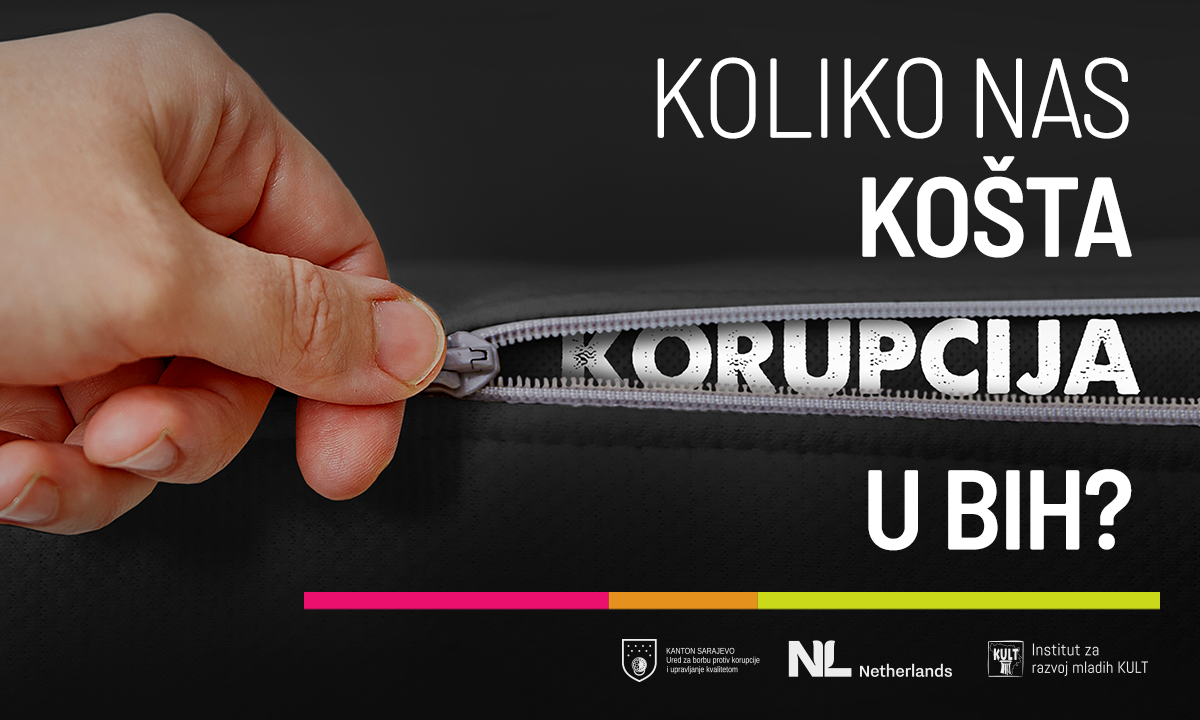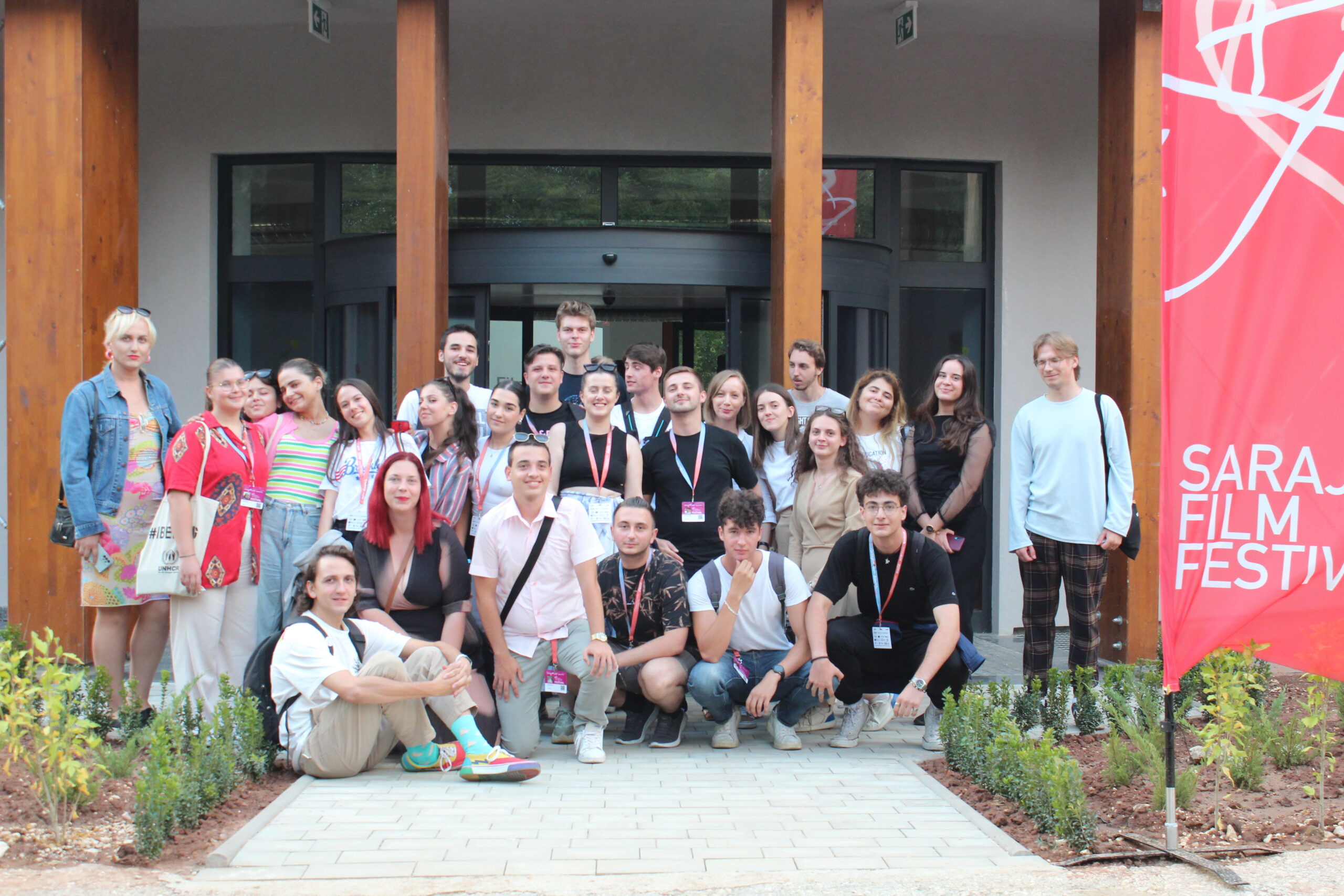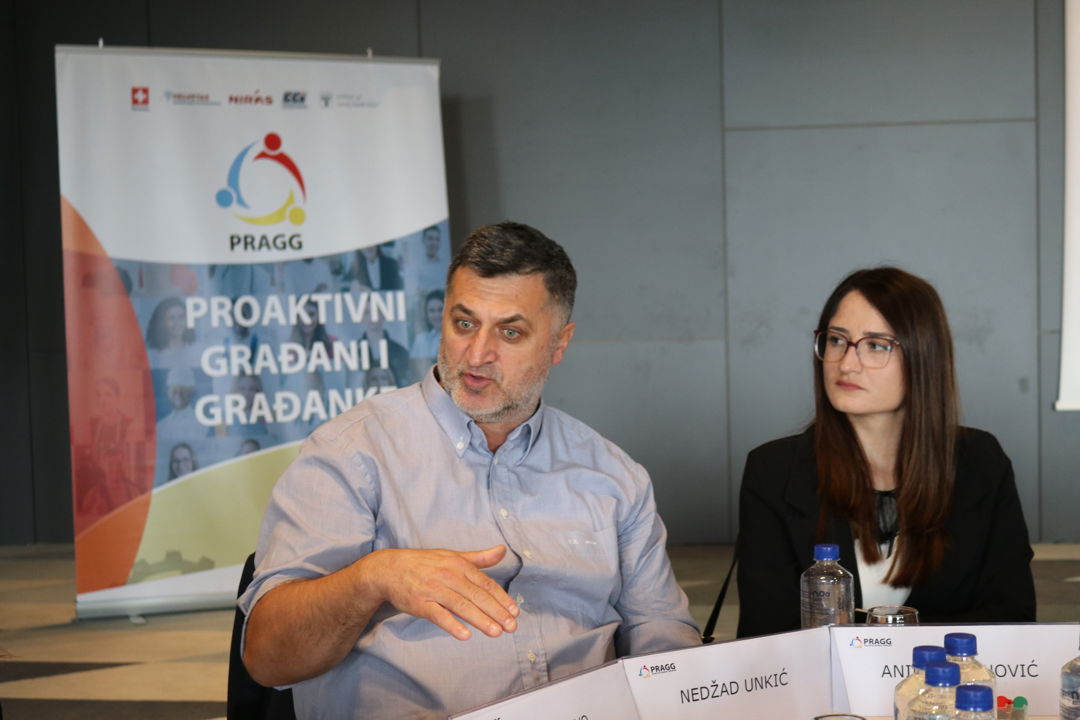The 2021 Survey on the position of young people in BiH by the Institute for Youth Development KULT revealed that over 50 percent of young people expressed a desire to leave the country. One of the most common reasons young people cite for wanting to leave is corruption, which ranks fourth among their top concerns, following unemployment, rising living costs, and the overall economic situation.
Since September 2021, the Institute for Youth Development KULT, in cooperation with the Anti-Corruption and Quality Control Office of the Sarajevo Canton and with support from the Embassy of the Kingdom of the Netherlands, has been conducting the Say NO to Corruption initiative. During a series of workshops involving over 350 young people, participants learned about concepts related to corruption and the institutional and strategic responses BiH implements to combat it. They also had the opportunity to discuss and reflect on the importance of fighting corruption and to share their views on preventing and eradicating corruption. Although young people view corruption as a problem that is important to solve, they mostly recognize corrupt actions where the consequences are felt immediately, such as asking for and offering bribes in public institutions and daily life. The young participants in the Say NO to Corruption initiative in Sarajevo Canton have concluded from the workshops that strengthening moral condemnation and rejecting corruption is the initial step society needs to take toward controlling this phenomenon. However, they acknowledge that we often overlook the long-term consequences of corrupt actions, such as the loss of public funds.
Bearing in mind the results of the Survey on the position of young people in BiH and the link between corruption, a key driver of emigration among young people, and one of the country’s most pressing long-term sustainability challenges, the Institute for Youth Development KULT collaborated with Dr. Faruk Hadžić to conduct an analysis on the costs of corruption in Bosnian society. This analysis focused specifically on the loss of investment in education and the financial burdens caused by youth emigration. The analysis included data on emigration from BiH gleaned through first and permanent residence permits in EU member states. Based on this data, along with other studies and research, calculations were made to estimate the direct losses in educational investment linked to corrupt activities. Between 2014 and 2019, BiH lost 9.96 billion BAM invested in the education of citizens who left the country. This is how much human capital our country exported. The indirect effects of corruption on emigration are also evident in the amount of unpaid contributions and taxes. For instance, annual unpaid contributions per worker increased from 561.8 million BAM in 2014 to 842.5 million BAM in 2019, which would have been collected if these citizens had remained living and working in Bosnia and Herzegovina.
The first step in assessing the economic effects of corruption involved determining the cost of education per person in Bosnia and Herzegovina, using findings from a 2020 study by the Westminster Foundation [1] in BiH. This study examined: a) the average cost of education for a highly educated individual and b) the opportunity cost associated with the loss of potential GDP resulting from annual emigration.
The analysis reveals the calculated costs of investing in education as follows: 25,306.5 BAM for elementary education per person, 39,544.9 BAM for secondary education per person, 56,589 BAM for higher education per person, and 84,364.7 BAM for doctoral studies per person. These amounts are costs for the BiH society because part of the education costs are paid by families directly, but also indirectly through taxes that fund the education sector.
Eurostat data on the number of permits issued to BiH citizens show that from 2014 to 2020, 261,713 citizens left BiH, which is 9.96 billion BAM in exported human capital, which is the amount invested in their education. Due to the emigration of young people aged 25-34, Bosnia and Herzegovina lost 2.4 billion BAM invested in their education. This is a quarter of the total value of lost human capital from investments in education.
An analysis of the cumulative number of permits issued to citizens of BiH indicates that 87% of the initial permits were issued for reasons related to employment and family. The data indicates that the youth category of emigrants (aged 15-34) is the biggest group of BiH citizens who received permanent permits in the European Union (149,283 permits issued by the end of 2019). Moreover, this age group saw the most significant increase in the number of permits issued by the end of 2019 compared to 2014, with 38,362 more permits issued. When combining the data for the 15-34 and 35-49 age groups, we see that 61.8% of all issued permanent permits were granted to individuals from BiH aged between 15 and 49. This age bracket is the most progressive segment of society, and they are the biggest consumers as well. These data formed the foundation for further assessing the costs of investment in education and the taxes and contributions uncollected due to emigration, exacerbated by corruption in BiH.
Data on issued permanent permits and average salaries was used to calculate the tax obligations of employers based on the average salary. This assessment helped determine the amount of lost contributions and direct taxes due to emigration. In 2019 alone, the total amount of unpaid contributions reached 842.5 million BAM, which is lost income that would have been collected had these citizens remained in BiH and continued working. In 2019, Bosnia and Herzegovina lost 251.6 million BAM in unpaid contributions per worker solely due to the emigration of young people aged 25 to 34. This figure represents the annual amount of unpaid contributions and does not include lost revenue from other taxes like VAT and excise taxes, which would have been collected from their spending had they remained in the country. Estimating the actual loss due to the reduced consumption of people who have left BiH is complex, as it varies based on individual consumption habits, which directly impact the collection of consumption taxes such as VAT.
Further analysis of the assessment of unpaid contributions in 2019, totaling 842.5 million BAM, reveals that 300.5 million BAM represents lost contributions for healthcare, and 416.9 million BAM denotes unrealized retirement and disability insurance contributions. These unrealized contributions could have been used to increase pensions and improve the living standards of pensioners. Had these pension contributions been collected and distributed as intended, each of the 691,488 pensioners receiving pensions in 2019 would have received an additional 603 BAM annually, equating to an average increase of 50.3 BAM per month. The inability to improve the financial security of pensioners is a direct result of the losses caused by corruption, which has contributed to emigration from Bosnia and Herzegovina.

We will illustrate the impact of the 300.4 million BAM lost in unpaid healthcare contributions in 2019 by showing what could have been done with that money to improve the health system. If this amount had been collected and directed into healthcare, it could have built six brand new hospitals, each costing 50 million BAM, in just one year. The money could also have been invested into something else, like purchasing 300 MRI scanners, assuming that they cost 1 million BAM each. Buying mammography systems is another example. If one 3D mammography system costs 500,000 BAM, we could have bought 601 of them. This money could also have been used for free gynecological services for women. It would cover 2,006,667 free gynecological services, where one exam with a Pap smear would cost 150 BAM. However, the effects of corruption, which also contribute to emigration from Bosnia and Herzegovina, have led to significant indirect consequences, such as lower-quality health and social services.

With the 9.96 billion BAM invested in the education of human capital BiH lost from 2014 to 2020, we could have…
- built 200 kilometers of highway – if 1 km costs 50 million BAM on average
- or bought 996 million textbooks – if one costs 10 BAM
- or bought 3.98 million smart boards for schools.
We could have – but we didn’t because, between 2014 and 2020, we lost 261,713 people who left Bosnia and Herzegovina, largely due to corruption!
We lack analyses that answer how much corruption in public procurement, construction tenders, and similar processes costs us directly and indirectly. We have no studies on the financial impact of unaddressed abuses of power, even though we see the damage done to our security, education, health, ecology, and the economy, as well as losses in both material terms and human lives.
[1] https://green-council.org/publik/Troskovi_emigracije_mladih_iz_BiH.pdf
















Leave a comment